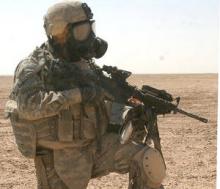The U.S. Department of Defense and anti-terrorist organizations are growing increasingly concerned about the trade in fake botulinum toxin because, and there’s a long string to this, it could somehow be at the root of production of a weapon of mass destruction (The Washington Post, "Officials Fear Toxic Ingredient in Botox Could Become Terrorist Tool," Jan. 25, 2010).
Undoubtedly, United Nations inspectors and C.I.A. agents found vials of Botox (onabotulinumtoxinA) in Saddam Hussein’s arsenal, but my guess is that those were for personal use, not for carrying out his genocidal plans.
It’s unclear what spurred the article, but much of it appears to be derived from a study conducted by some researchers at the James Martin Center for Nonproliferation Studies. A quick look at its Web site shows the nonprofit group has been reporting for years that Al-Qaeda, and countries known to harbor militants (such as Libya) have the capacity to produce mass quantities of botulinum toxin, the base raw ingredient for Botox. Botulinum toxin is also a highly lethal poison.
The newspaper article contends that counterfeit Botox producers may have access to large stocks of botulinum toxin, and thus... well, I’m not sure what the thus is, except that maybe they could be terrorists?
A blogging defense policy analyst called The Post’s assertions “ridiculous.”
The Post went on to say that a 2004 federal raid determined that one fake Botox outfit had used industrial grade botulinum toxin instead of the materials approved for human use, resulting in the paralysis of four people.
Granted, counterfeit medications are a huge and growing problem, as the story acknowledged. Botox manufacturer Allergan was quoted in the story as saying that the company was working with China to crack down on illicit manufacturers in that nation.
But the story alleged a bigger danger from the fakery. An unnamed “U.S. investigator” told the Post: “We know al-Qaeda has talked about going after food supplies in the United States. There are new reasons to be concerned about what they’re going to target next.”
Perhaps the nation’s millions of Botox users?
-- Alicia Ault (on Twitter @aliciaault)
Image courtesy U.S. Army via Flickr Creative Commons


